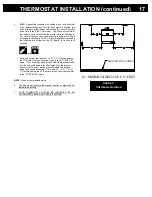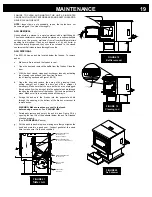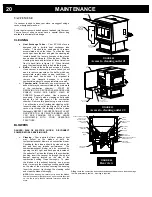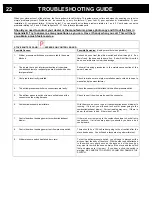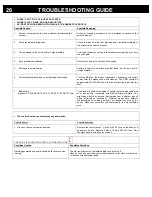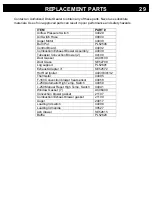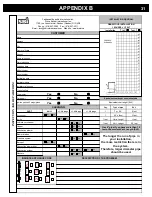
CHIMNEY CLEANING
a.
Creosote Formation
– When any wood is burned slowly, it produces tar and other organic vapors, which combine with expelled
moisture to form creosote. The creosote vapors condense in the relatively cool chimney flue or a newly started fire or from a slow-
burning fire. As a result, creosote residue accumulates on the flue lining. When ignited, this creosote makes an extremely hot fire,
which may damage the chimney or even destroy the house. Despite their high efficiency, pellet stoves can accumulate creosote under
certain conditions.
b.
Fly Ash
– This accumulates in the horizontal portion of an exhaust run. Though noncombustible, it may impede the normal exhaust
flow. It should therefore be periodically removed.
c.
Inspection and Removal
– The chimney connector and chimney should be inspected annually or per ton to determine if a creosote or
fly ash build-up has occurred. If creosote has accumulated, it should be removed to reduce the risk of a chimney fire. Inspect the
system at the stove connection and at the chimney top. Cooler surfaces tend to build creosote deposits quicker, so it is important to
check the chimney from the top as well as from the bottom.
The creosote should be removed with a brush specifically designed for the type of chimney in use. A qualified chimney sweep can perform
this service. It is also recommended that before each heating season the entire system be professionally inspected, cleaned and, if
necessary, repaired.
To clean the chimney, detach the vent at the combustion blower transition where it is attached to the blower.
RECOMMENDED MAINTENANCE SCHEDULE
Use this as a guide under average-use conditions.
Components
Daily
Weekly
or after
+/- 10 bags
Twice a year
or after
+/- 25 bags
Annually
or
per ton of pellets
Burn Pot
Empty
Empty / Brush
Glass Wipe
Clean
Heat Exchanger Tubes
Activate cleaning
rod every time you
load the stove
Activate cleaning rod
and vacuum
Baffle
Empty
and
brush
Convection Blower
Filters
Vacuum
Ashe Drawer
Empty
Combustion Chamber
Vacuum
Vacuum / Brush
Left-hand Channel
Vacuum
Exhaust Blower
Vacuum
Pressure Switch Tap
Brush
Venting System
Inspect
Sweep
Gaskets
Inspect
Hopper
Empty
/
Vacuum
Gasket around door and door glass should be inspected and repaired or replaced when necessary (see “
REPLACEMENT PARTS
”).
REMOVAL AND REPLACEMENT OF BROKEN DOOR GLASS
While wearing leather gloves (or any other gloves suitable for handling broken glass), carefully remove any loose pieces of glass from the
door frame. Dispose of all broken glass properly. Return the damaged glass to your Drolet Dealer for replacement. It is absolutely critical
that you replace the glass with a genuine one supplied by your dealer.
MOTOR OILING
Both the convection and combustion/exhaust blowers have sleeve bearings that are permanently sealed. No oiling is required
.
MAINTENANCE
21











